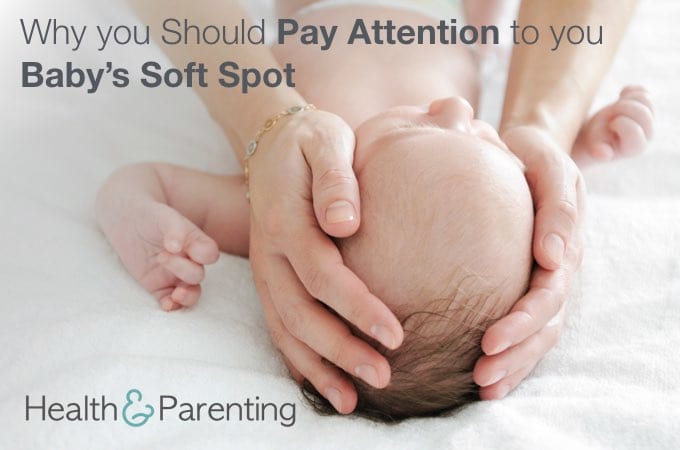The fontanel is the name given to the soft spots on your baby’s head. The bones of your baby’s skull have not yet closed, leaving soft spots on the top of the head. The bones are open during birth to allow the baby being born. They remain open for a few months after the birth to allow for rapid brain growth. The soft spot at the back of the skull is the first to close, usually be the time your baby is eight weeks old. The anterior fontanel (the soft spot nearer the front of the skull) should close by the time your baby is around 18 months old though it could happen as early as nine months.
Parents often worry about injury to the soft spot, but, in fact, it is quite tough. Though it is called the soft spot, it is actually quite firm. Your healthcare provider will check your baby’s fontanel at each visit. A healthy baby’s fontanel should curve inwards very slightly. Keeping a close eye on your baby’s soft spot is important because it can provide clues to your baby’s health.
Sunken Fontanel
If your baby’s fontanel appears sunken, this could be a sign of dehydration. Babies are at an increased risk of dehydration so it’s important to recognize the symptoms of this condition. A sunken fontanel, reduction in wet diapers, dark urine and lethargy are other symptoms of dehydration in babies. Severe dehydration is a medical emergency and requires immediate medical attention. If your doctor diagnoses dehydration, your baby may be offered IV fluids as treatment. To reduce the risk of dehydration, you should ensure your baby has enough to drink on warmer days. For formula fed babies, you can offer cooled water in a bottle between feeds. Breastfed babies usually do not need any water though you may notice that they breastfeed more frequently on hot days.
Malnutrition, also known as ‘failure to thrive’, can also be a cause of sunken fontanel. An inability to absorb the nutrients from milk can be caused by feeding problems, food intolerances and genetic conditions. If your doctor thinks ‘failure to thrive’ is the cause of the sunken fontanel, you may be offered breastfeeding support.
Bulging Fontanel
A bulging fontanel can be a sign that something is wrong with your baby. A bulging fontanel can be a symptom of meningitis and a number of other serious conditions, so it’s important you seek emergency medical help immediately if your baby’s fontanel is bulging.
If you have any concerns about your baby’s fontanel, speak to your baby’s doctor. If the fontanel is bulging, don’t wait for a doctor’s appointment, instead seek emergency medical assistance straight away.
Written by Fiona (@Fiona_Peacock), mother, writer and lover of all things baby related.
This information is not intended to replace the advice of a trained medical doctor. Health & Parenting Ltd disclaims any liability for the decisions you make based on this information, which is provided to you on a general information basis only and not as a substitute for personalized medical advice. All contents copyright © Health & Parenting Ltd 2016. All rights reserved.










